FEDtalk by Shaw Bransford & Roth
Welcome to FEDTalk, the premier podcast series by Shaw Bransford & Roth P.C., delivering an insider’s perspective on the federal community since 1993. We bring you expert insights from leaders across the federal community, offering an in-depth look at the latest developments from federal agencies, Capitol Hill, and beyond.
Episodes
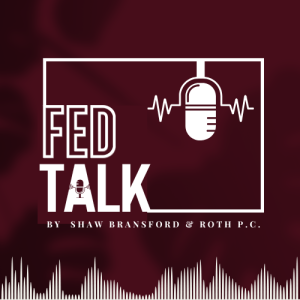
Tuesday Oct 15, 2024
Presidential Transition considerations for Acquisition community
Tuesday Oct 15, 2024
Tuesday Oct 15, 2024
In this episode of FEDtalk, host Jason Briefel interviews Troy Cribb, Director of Policy at the Partnership for Public Service, about the presidential transition and its impact on the federal and contractor acquisition workforce. They discuss the importance of the acquisition function in government, the preparations agencies are making for the transition, and the key dates and deadlines involved. Cribb shares insights from her experience working in government and at the General Services Administration (GSA), emphasizing the need for comprehensive briefings and education for incoming appointees. The Partnership’s Center for Presidential Transition offers resources and programs to support agencies and appointees during the transition.
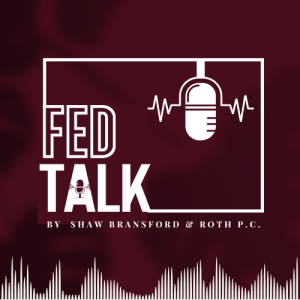
Tuesday Jul 09, 2024
Career Pathways: Navigating Public vs. Private Sectors
Tuesday Jul 09, 2024
Tuesday Jul 09, 2024
In this episode of FEDtalk, host Jason Briefel interviews Helene Bumbalo, the Associate Director of Graduate Professional Development at the Virginia Commonwealth University (VCU) School of Business, about career counseling in 2024. Helene shares her unconventional career path and emphasizes the importance of staying flexible and open to new opportunities. She discusses the diverse student population at VCU and the unique challenges they face in navigating the job market. Helene also highlights the changing landscape of job applications, with the increasing use of artificial intelligence and the need for proactive networking before applying. She explores the differences between pursuing opportunities in the public and private sectors and shares innovative approaches to connecting students with federal agencies. She emphasizes the importance of bringing real-life professionals into the classroom to expose students to different career paths. Bumbalo also highlights the value of programs like the Federal Advisor Certificate Program, which prepares career counselors to help students navigate the federal hiring process. She encourages hiring managers to reach out to career programs and utilize alumni connections to find talent. Bumbalo advises job seekers to seek help from career counselors and utilize resources like LinkedIn to navigate the changing employment landscape.
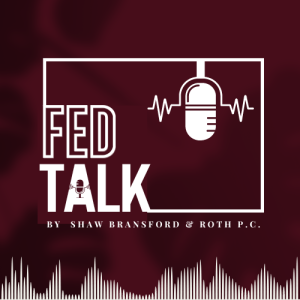
Monday Apr 29, 2024
Monday Apr 29, 2024
Summary
In this episode of FEDtalk, hosts Natalia Castro and Jason Briefel are joined by Catrina Bonus and Jessie Lane from Women in Federal Law Enforcement (WIFLE) to discuss National Police Week and the 25th anniversary of WIFLE. They talk about the history and mission of WIFLE, which is dedicated to the recruitment, retention, and advancement of women in federal law enforcement. They also highlight the various programs and initiatives that WIFLE has implemented to support women in law enforcement, including community engagement, mentorship, and partnerships with federal agencies, military organizations, and international partners. The conversation also touches on the importance of diversity and inclusion in law enforcement and the significance of National Police Week in honoring fallen officers. The conversation highlights the importance of gender diversity in law enforcement and the efforts of WIFLE to promote and support women in the field. The guests discuss the 30x30 Initiative, which aims to increase the representation of women in law enforcement to 30% by 2030. They emphasize the need for not just hiring, but also promoting and retaining women in leadership positions. The conversation also touches on the unique strengths that women bring to law enforcement, such as compassion and de-escalation skills. WIFLE's annual leadership training is mentioned as a key event that provides education, networking, and recognition for women in law enforcement. To register for the 2024 WIFLE Leadership Summit, August 5-8 in Washington, DC, visit: https://wiflefoundation.org.
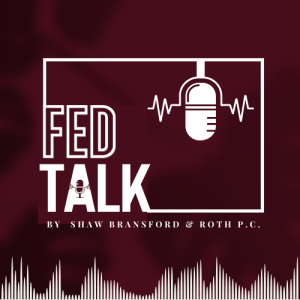
Tuesday Apr 02, 2024
What the Flux is Going on in the Federal Government?
Tuesday Apr 02, 2024
Tuesday Apr 02, 2024
Summary
In this episode, the hosts Jason Briefel and Natalia Castro recap Season One of FEDtalk and discuss key considerations for the federal government moving forward. They explore the concept of the federal government in flux, highlighting the impact of technology and the need for adaptability. They also discuss the evolution of federal power and the importance of capacity issues across the branches of government. The hosts emphasize the need to focus on people and the role of politics and accountability in government. They reflect on the federal community and encourage civil servants themselves to embrace and lead change for a better government.
Takeaways
The federal government is in a state of flux due to rapid changes in technology, society, and the economy.
Adaptability is crucial for the government to effectively respond to these changes.
Capacity issues exist across all three branches of government and need to be addressed.
Focusing on people and civil servants embracing change themselves is essential for improving the government.
Sound Bites
Chapters
00:00Introduction and Recap of Season One
03:15The Federal Government in Flux
06:00The Impact of Technology on Government
09:46The Need for Adaptability in Government
11:39The Evolution of Federal Power
19:39The Importance of Focusing on People
23:47The Role of Politics and Accountability in Government
26:39Reflections on the Federal Community
30:19Moving Forward and Embracing Change
39:26Closing Remarks
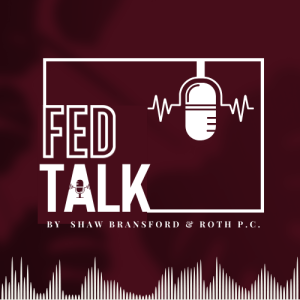
Tuesday Apr 02, 2024
Enhancing Congressional Oversight
Tuesday Apr 02, 2024
Tuesday Apr 02, 2024
Summary
This episode of FEDtalk focuses on congressional oversight and its function in the constitutional system. The guests, Tim Stretten from the Project on Government Oversight’s (POGO) Congressional Oversight Initiative and Elise Bean from the Carl Levin Center for Oversight and Democracy at Wayne State University Law School in Detroit, discuss the importance of effective oversight, the challenges faced in conducting oversight, and the role of training and assistance for congressional staff. They emphasize the need for bipartisanship, time and resources, and credibility in conducting oversight. The guests also highlight the role of other oversight partners such as inspectors general and the Government Accountability Office. Overall, the conversation highlights the importance of oversight in promoting a more ethical and effective government.
Takeaways
Congressional oversight is a core power of Congress to gather information necessary for legislation and ensuring proper administration of existing laws.
Effective oversight requires bipartisanship, time and resources, credibility, and a focus on producing legislative change.
Training and assistance programs, such as congressional oversight boot camps run by nonprofits like POGO and the Levin Center, help educate congressional staff on how to conduct better oversight.
Collaboration with other oversight partners, such as inspectors general and the Government Accountability Office, can enhance the effectiveness of congressional oversight.
Challenges in oversight include partisanship, lack of institutional knowledge, and resistance from agencies.
Chapters
00:00Introduction
00:31Focus on Congressional Oversight
01:26Introduction to the Levin Center and POGO
04:20Congressional Training and Assistance
06:41Importance of Bipartisanship in Oversight
08:02Congressional Oversight Boot Camps
09:29Qualities for Effective Oversight
13:23Challenges in Partisanship and Lack of Oversight
26:23Challenges in Agency Responsiveness
28:34Improving Congressional Staff Capacity
31:19Collaboration with Inspector General Community
36:00Importance of Institutional Knowledge and Staff Tenure
40:32Congressional Oversight Standards
Key Links & Resources:
Levin Center for Legislative Oversight and Democracy (levin-center.org)
Congressional Oversight Staff Resources (pogo.org)
We Held our 18th Oversight Boot Camp in D.C. • Levin Center (levin-center.org)
Our Work: The Lugar Center
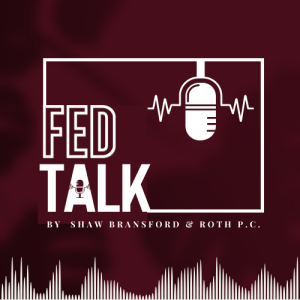
Tuesday Apr 02, 2024
Executive Power Over Employees
Tuesday Apr 02, 2024
Tuesday Apr 02, 2024
In this episode of FEDtalk, the hosts are joined by author and lawyer Philip K. Howard to discuss executive power over employees and the impact of public employee unions. They explore the constitutional context of executive power, including the Take Care Clause and the Guarantee Clause. The importance of accountability and elections in a democratic government is emphasized. The conversation delves into the relationship between Congress and executive power, as well as the challenges faced by management in dealing with public employee unions. The episode concludes with a discussion on the evolution of public employee unions and examples of cooperation between unions and management. The conversation explores the need for a new model of governance that empowers public employees and allows for more effective decision-making, as discussed in Howards’s Everyday Freedom and Not Accountable. It discusses the limitations of the current system and proposes changes to the Civil Service Reform Act to address these issues. The importance of treating professionals like professionals and giving officials more authority is emphasized. The conversation also highlights the need for human judgment and the challenges of political firings. The role of senior civil servants in driving change and the need for radical de-layering of government are discussed. The conversation concludes with a call for the creation of frameworks that empower individuals and lead to a better democracy.
Takeaways
Executive power is vested in the president, who has the authority to manage the federal workforce and ensure the faithful execution of laws.
The guarantee clause in the Constitution ensures that states maintain a republican form of government and cannot delegate governing authority to non-elected individuals.
Public employee unions have undermined democratic government by limiting accountability and obstructing the ability of managers and presidents to enforce the law.
Unions in the public sector have accumulated power and negotiated for more controls, impeding effective management and decision-making.
Cooperation between unions and management can lead to positive outcomes, but the lack of support for management in dealing with employee conduct and performance issues remains a challenge.
Chapters
00:00Introduction
00:34The Constitutional Context
03:24The Take Care Clause and Guarantee Clause
05:20Accountability and Elections
06:45Congress and Executive Power
08:27The Impact of Public Employee Unions
12:16Unions and Democratic Government
16:12The Unconstitutionality of Public Employee Unions
24:06Examples of Cooperation
26:40Challenges for Management
27:22Incentives for Partnering with Unions
27:52The Need for a New Model
28:39How Change Can Come About
29:05The Limitations of Congress
30:30Proposed Changes to the Civil Service Reform Act
32:11Replacing Disciplinary Procedures
33:11Giving Officials More Authority
34:13Treating Professionals Like Professionals
35:49The Need for Human Judgment
36:19The Issue of Political Firings
37:17Empowering Senior Civil Servants
38:38The Gap Between Political Appointees and Federal Employees
39:26The Need for Radical De-layering of Government
40:25Empowering People at Every Level
41:23Creating a New Merit System Protection Board
42:25The Challenge of Offering Ideas for Improvement
43:49The Need to Reboot the System
44:06The Role of Public Employees in Driving Change
45:38Creating Frameworks for Empowerment
48:32The Challenge of Giving Space to Civil Servants
49:29The Better Government Movement
51:00The Need for Structural Overhaul
52:21Empowerment and a Better Democracy
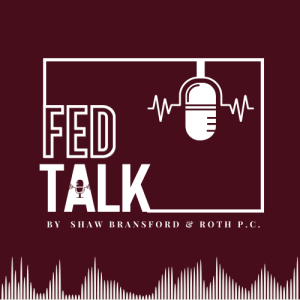
Friday Feb 09, 2024
Judicial Capacity Are the Courts Ready & Able to Navigate Big Change?
Friday Feb 09, 2024
Friday Feb 09, 2024
In this episode of FEDtalk, Natalia Castro and Jason Briefel discuss major issues impacting the federal judiciary with guest Ben Robinson, Chair of the Federal Bar Association's Government Relations Committee. They cover topics such as congressional investment in the courts, the impact of increased caseloads, key issues for the Federal Bar Association, challenges in advocating for judicial resources, the impact of judicial vacancies, the perception vs reality of judicial politicization, the role of administrative tribunals, and favorite Supreme Court justices.
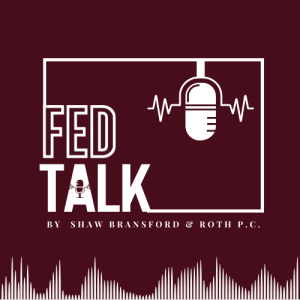
Friday Feb 09, 2024
Agency 'independence'
Friday Feb 09, 2024
Friday Feb 09, 2024
In this episode of FEDtalk, Natalia Castro and Jason Briefel discuss agency independence in the executive branch with Adam White, a senior fellow at the American Enterprise Institute and Co-Director of the C. Boyden Gray Center for the Study of the Administrative State.
They explore the historical background of the executive branch, the growth of the modern administrative state, and the concept of independence for different types of agencies and federal employees. They also delve into the Supreme Court's role in grappling with agency independence and the potential impact of upcoming cases, such as two cases challenging Chevron defense, on the federal bureaucracy.
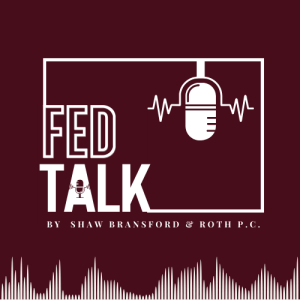
Friday Feb 09, 2024
Congress as First Branch, Once Again
Friday Feb 09, 2024
Friday Feb 09, 2024
Summary
In this episode of FEDtalk, the focus is on Congress as the first branch of the federal government. The conversation begins with an introduction and a discussion about the current state of Congress and its functioning. The guests then provide historical context, highlighting the changes in Congress over time. The conversation further explores the efforts and collaborations to modernize Congress, the role of technology in the legislative branch, funding and workforce enhancements, and the importance of diversity in congressional staff.
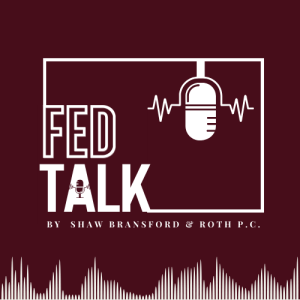
Wednesday Jan 10, 2024
Federal Government in Flux
Wednesday Jan 10, 2024
Wednesday Jan 10, 2024
Summary
In this episode, Jason Briefel and Natalia Castro of FEDtalk interview Max Stier, the President and CEO of the Partnership for Public Service. They discuss the mission of the Partnership, which is building a better government and stronger democracy. They also explore the challenges of navigating partisanship and political pressure, the importance of trust in government, and the role of the private sector versus the public sector in solving national problems. Max shares his favorite public servant and highlights the initiatives and opportunities the Partnership is focusing on in 2024.
Takeaways
The Partnership for Public Service works to make the federal government more effective and efficient.
Navigating partisanship and political pressure is a challenge, but the Partnership remains nonpartisan in its approach.
Building trust in government and educating the public on the role of government are important initiatives.
Leadership transitions and succession planning are crucial for the future of the federal workforce.
To learn more about the Partnership for Public Service, visit: Home • Partnership for Public Service (ourpublicservice.org). To nominate people or teams for consideration for the Partnership’s Service to America Medal, click here.
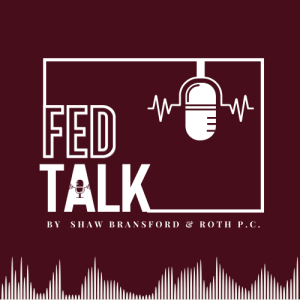
Wednesday Jan 10, 2024
The Top Federal Employment Cases of 2023
Wednesday Jan 10, 2024
Wednesday Jan 10, 2024
Summary
This episode of FEDtalk explores the top federal employment cases of 2023. The conversation covers a range of topics, including religious accommodations in the workplace, the correct legal standards for discrimination claims, and the proper application of Bivens litigation. The hosts and guests discuss these cases' impact on federal employees and agencies and the broader implications for trust and accountability in the federal government. This episode of FEDtalk explores various aspects of employee removal processes, the consequences of incorrect legal standards, the importance of upholding individual rights, transparency and accountability in federal agencies, limitations on agency authority, and challenges to unconstitutional agency structures.
Takeaways
The Supreme Court clarified the legal standards for religious accommodations in the workplace in the case of Groff v. DeJoy, emphasizing the need for a substantial burden on the employer to deny accommodation.
An Inspector General report revealed that the Department of Interior's Office of Diversity, Inclusion, and Civil Rights had been applying an incorrectly low burden of proof in discrimination cases, highlighting the importance of applying the correct legal standards.
The Federal Circuit ruled in Williams v. BOP that when an agency fails to prove all charges on appeal, the adjudicator must independently assess the penalty, rather than deferring to the agency's evaluation.
The discussion also touched on the ongoing debate over Bivens litigation and the limitations on bringing lawsuits against federal employees for constitutional violations.
Congress's experiments with VA accountability reform have resulted in changes to the removal process for senior executives and other employees, aiming to address concerns about performance and misconduct in the VA workforce. There are different processes for removing employees based on misconduct or performance.
Incorrect legal standards can have significant consequences, leading to the reinstatement of employees who should have been fired.
Upholding individual rights is crucial to ensure equal and just enforcement of the law.
Transparency and accountability are essential in federal agencies to establish the legitimacy of their actions.
There are limitations on agency authority, and agencies must adhere to established standards and processes.
Challenges to unconstitutional agency structures are being increasingly recognized by the courts.
To read the full case law updates, visit here: https://www.shawbransford.com/case-law-update
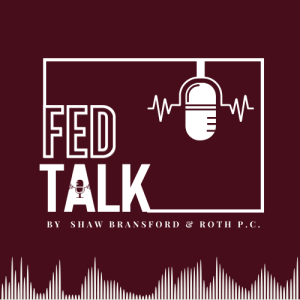
Wednesday Jan 10, 2024
Reintroducing FEDtalk
Wednesday Jan 10, 2024
Wednesday Jan 10, 2024
Summary
Hosts introduce FEDtalk 3.0 as the next generation of the FEDtalk podcast, with a new format and approach while maintaining a focus on improving and informing the federal community. Hosts Jason Briefel and Natalia Castro discuss the history of FEDtalk, starting with its origins as a live call-in radio show for legal advice and employment matters. Next, learn about the transition to FEDtalk 2.0, a live recording in a studio. Then, the shift to remote recording during the pandemic is highlighted as a transformative experience. FEDtalk 3.0 is features co-hosts and a new season-based format. Season 1, Federal Government in Flux, airs January thru May 2024.
Takeaways
FEDtalk 3.0 is the next generation of the FEDtalk podcast, with a new format and approach.
The history of FEDtalk includes its origins as a live call-in radio show for legal advice and employment matters. Mike Causey invited Jerry Shaw to start FEDtalk on the early Federal News Radio.
FEDtalk 2.0 involved live recordings in a studio, while FEDtalk 3.0 embraced remote recording during the pandemic and the same wide range of engaging guests.
FEDtalk 3.0 will be co-hosted by Jason Briefel & Natalia Castro and follows a new season-based format. Season 1 will air January – May 2024.
FEDtalk Season 1 2024 – Federal Government in Flux will explore how change is affecting all 3 branches of government
The FEDtalk podcast archives (prior to 2024) can be accessed here.
Chapters
00:00Introduction to FEDtalk and History of FEDtalk
03:07Transition to FEDtalk 2.0
05:40Transition to FEDtalk 3.0
07:23Overview of FEDtalk 3.0 and Season 1: Federal Government In Flux
09:43Approach of FEDtalk 3.0 and Co-Hosting: Jason Briefel & Natalia Castro
11:36Focus on Branches of Government and Major Problems
13:51Importance of Big Questions and Impact on Trust in Government
16:05Preview of First Part of FEDtalk Season 1, 2024
17:44Closing Remarks and Invitation to Listen
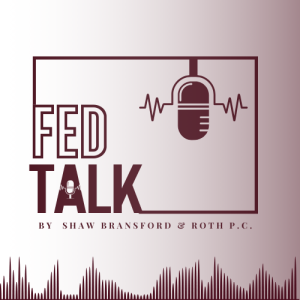
Thursday Oct 12, 2023
Navigating Congressional Chaos: A Federal Employee’s Guide
Thursday Oct 12, 2023
Thursday Oct 12, 2023
While Congress narrowly averted a shutdown last weekend, federal employees’ fear of a lapse in appropriations this November has not been alleviated. On this week’s FEDtalk, we break down the current state of Congress, how federal employees can prepare for what is to come, and how Congress can act now to prevent these issues in



